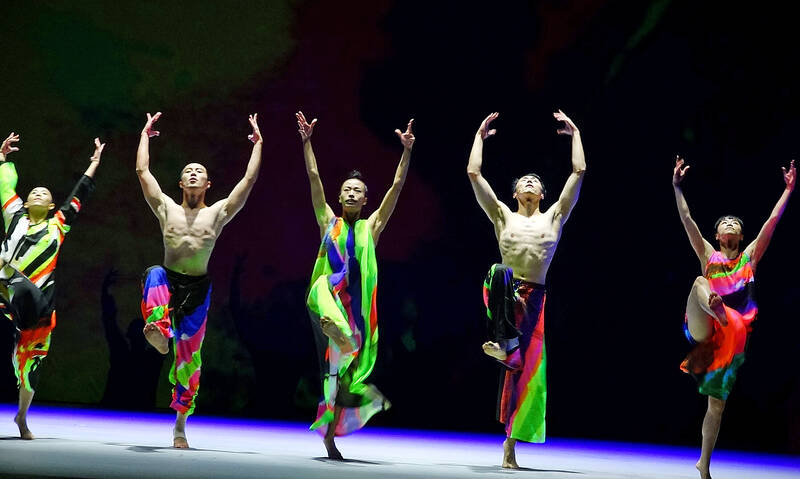Cloud Gate Dance Theatre’s ongoing 13 Tongues tour in the US has sparked interest in Taiwan, the dance troupe’s artistic director said ahead of three performances in the US capital.
“It has been really exciting,” Cloud Gate artistic director Cheng Tsung-lung (鄭宗龍) said on Wednesday last week, adding that he has received interesting feedback on the tour of the 2016 piece he created based on childhood memories.
Cheng said he was very happy about sharing through the piece what he saw and experienced of the vibrant life and local religious rituals in Taipei’s Bangka (艋舺) area, growing up in the 1980s.

Photo: CNA
The feedback received from US audience has been intriguing, with some telling him the piece reminded them about past trips to Taiwan, while others said they wanted to visit the country after the show, he said.
Compared with past works presented by the dance troupe before he took over as leader in 2020, Cheng said 13 Tongues has been enriched by the dancers singing and chanting mysterious mantras.
The piece also showcases a different dancing style that is perhaps not aesthetically elegant, but demonstrates a raw energy, he said.
The US tour is Cloud Gate’s first overseas tour in more than two years, after the troupe wrapped up a European tour of 13 Tongues in February 2020 amid the spread of COVID-19 around the world.
Cloud Gate began the tour in Houston, Texas, on Oct. 1, and has since given a performance in Stanford, California, two in Chicago, and at the Eisenhower Theater of the John F. Kennedy Center for the Performing Arts in Washington from Thursday to Saturday last week.
The dance troupe is set to conclude its month-long US tour in California, with one performance scheduled at the Segerstorm Center for the Arts in Costa Mesa today and two at the University of California, Berkeley on Saturday and Sunday.
Next year, Cloud Gate is to celebrate its 50th anniversary by restaging founder Lin Hwai-min’s (林懷民) 1978 work Legacy (渡海), said Cheng, who plans to present a new piece and take it on tour to Europe next year.

Costa Rica sent a group of intelligence officials to Taiwan for a short-term training program, the first time the Central American country has done so since the countries ended official diplomatic relations in 2007, a Costa Rican media outlet reported last week. Five officials from the Costa Rican Directorate of Intelligence and Security last month spent 23 days in Taipei undergoing a series of training sessions focused on national security, La Nacion reported on Friday, quoting unnamed sources. The Costa Rican government has not confirmed the report. The Chinese embassy in Costa Rica protested the news, saying in a statement issued the same

Taiwan’s Liu Ming-i, right, who also goes by the name Ray Liu, poses with a Chinese Taipei flag after winning the gold medal in the men’s physique 170cm competition at the International Fitness and Bodybuilding Federation Asian Championship in Ajman, United Arab Emirates, yesterday.

A year-long renovation of Taipei’s Bangka Park (艋舺公園) began yesterday, as city workers fenced off the site and cleared out belongings left by homeless residents who had been living there. Despite protests from displaced residents, a city official defended the government’s relocation efforts, saying transitional housing has been offered. The renovation of the park in Taipei’s Wanhua District (萬華), near Longshan Temple (龍山寺), began at 9am yesterday, as about 20 homeless people packed their belongings and left after being asked to move by city personnel. Among them was a 90-year-old woman surnamed Wang (王), who last week said that she had no plans

TO BE APPEALED: The environment ministry said coal reduction goals had to be reached within two months, which was against the principle of legitimate expectation The Taipei High Administrative Court on Thursday ruled in favor of the Taichung Environmental Protection Bureau in its administrative litigation against the Ministry of Environment for the rescission of a NT$18 million fine (US$609,570) imposed by the bureau on the Taichung Power Plant in 2019 for alleged excess coal power generation. The bureau in November 2019 revised what it said was a “slip of the pen” in the text of the operating permit granted to the plant — which is run by Taiwan Power Co (Taipower) — in October 2017. The permit originally read: “reduce coal use by 40 percent from Jan.